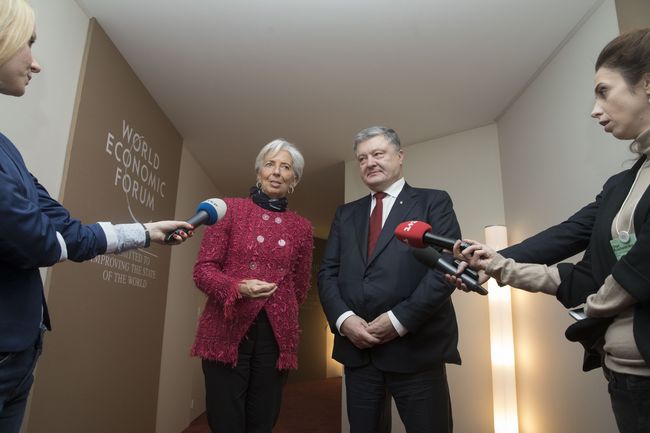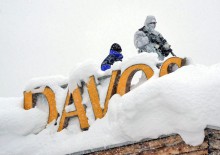This year Ukraine was represented more actively at the World Economic Forum in Davos, Switzerland. In addition to the traditional Ukrainian Luncheon, oligarch Viktor Pinchuk’s foundation organized, in partnership with other companies, another event – Ukraine House – which is supposed to show world business leaders opportunities to invest in the Ukrainian sectors of IT and innovations.
The foundation’s website says that the speech of Ukraine’s President Petro Poroshenko and a discussion with his participation was a key part of this event. Among the speakers were Chrystia Freeland, Canada’s Minister of Foreign Affairs; David Lipton, First Deputy Managing Director of the International Monetary Fund; Wolfgang Ischinger, Chairman of the Munich Security Conference; Aleksander Kwasniewski, President of Poland in 1995-2005; and Anders Fogh Rasmussen, NATO Secretary General in 2009-14.
“The central discussion of this year’s Davos Ukrainian Luncheon is related to the main topic of the 48th WEF Annual Meeting, ‘Creating a Shared Future in a Fractured World.’ It is in this very context that Ukraine will be discussed: investments, reform, achievements, issues, challenges, and other questions. Where is Ukraine heading in the changeable international environment? How can international partners support Ukraine in its struggle for territorial integrity, freedom, and the building of a country that relies on European values?” website pinchukfund.org says.
President Poroshenko pointed out in his speech: “It is very important to put across the truth about events in Ukraine in order to protect the world from fake news that is being actively spread all over the world. This kind of news is part of Russia’s hybrid war against not only Ukraine, but also the rest of the free world.”
In the president’s opinion, Ukraine is becoming more and more attractive to investors because reforms are underway. “I am proud that I received this year so many requests from foreign investors to meet them. A large number of big players on the investment market… This has never happened before. We plan to make amendments to the tax law, change the income tax to encourage the attraction of investments – but only in case funds are withdrawn from Ukraine. When you invest in Ukraine, you don’t pay taxes,” the head of state said. He also noted the initiative to establish the National Bureau of Financial Investigations.

As part of the world economic forum in Davos, President Petro Poroshenko of Ukraine met with IMF Managing Director Christine Lagarde. “It is very important for us to continue cooperation with the IMF now, in 2018,” Mr. Poroshenko pointed out. “I also welcomed that a nomination has been made for the appointment of a fully independent and permanent governor of the National Bank of Ukraine,” Ms. Lagarde emphasized / Photo by Mykhailo PALINCHAK
Another sore point is the establishment of an anticorruption court. “We continue cooperation with the IMF. I want to thank Christine Lagarde and David Lipton. We had a very nice opportunity to discuss what and when should be done, as well as the question of the Anticorruption Court. It is my initiative in parliament. And we should speed up the meeting of experts-lawmakers to make this bill ready for a second reading,” Mr. Poroshenko said.
“It is a special question what our politicians could say in Davos about the Anticorruption Court,” Member of Parliament Ostap YEDNAK comments to The Day. “One should go to Davos in order to attract resources and investments, to show how good and promising our country is, instead of excusing ourselves why we have taken no urgent steps to improve ourselves over this period. We must take a joint approach to this matter.”
Tellingly, a year ago the president refused to take part in Pinchuk’s Ukrainian Luncheon, although he was in Davos and had as number of high-level meetings. Some MPs and experts also boycotted the oligarch’s action. The root cause was Pinchuk’s so-called “painful compromises” in a Wall Street Journal article. The oligarch in fact devised the formula of a compromise for the sake of achieving “peace” in Ukraine. Ostensibly recognizing the occupied territories as Ukrainian, he in fact suggested giving them up in favor of the invader until better times. Pinchuk’s article stirred a wave of indignation among the public and politicians. What has changed in the past year? Have they already forgotten?
“Those who went to Davos really seem to have problems with memory,” Yednak says. “They’ve forgotten that a year ago Pinchuk suggested ‘painful compromises’ about the occupied Crimea and Donbas in a well-known newspaper. This year, as we can see, there were no public debates on whether or not to go there. Of course, it is good that Ukraine House was set up. But who did it? The Viktor Pinchuk Foundation is, incidentally, a partner to this project. He is trying to restore his reputation in this way. It is, naturally, useful to speak about business and innovations. But it is good that last year’s proposals of Pinchuk were not accepted further on.”
“I think medium-scale business can create a real alternative to Pinchuk’s projects,” the MP stresses. “So far, these people are beginning to do something still under Pinchuk’s umbrella. We can see now that one oligarch organizes this kind of informal contacts, while another oligarch, Petro Poroshenko, represents Ukraine on the official level. It is very negative that Ukraine is associated with a corrupt state plundered by oligarchs and represented by the same oligarchs. I hope that Ukrainian medium-scale business will become more self-sufficient and no longer depend on not-so-fair people. It is quite possible. We must break with parasites whose business is directly connected with pumping out state resources. Those who went to Davos today are simply unaware of the likely consequences for Ukraine: innovational businesses will become dependent on the governmental policy directly linked to certain oligarchs and financial-industrial groups.”
“I am stunned by the number of Ukrainian politicians at the Davos luncheon. Do they starve at home?” blogger Serhii Ivanov says in FB.
In all probability, they do not starve precisely there. But this does not apply to all. Some have been taking a principled stand for years. The first to call for boycotting the Kuchma-Pinchuk family’s projects was public activist Oleksii Podolsky, the aggrieved party in the Gongadze-Podolsky case. Later, Hanna Hopko, a public activist and now Chairperson of the Parliamentary Foreign Affairs Committee, picked up this initiative. Their calls, made well before the “painful compromises,” were mainly caused by the “contribution” Leonid Kuchma made in the “development” of Ukraine during his presidency. This also applied, incidentally, to the abovementioned Gongadze-Podolsky case, in which crime organizers have not yet been punished.
Hanna Hopko said in interview with The Day (No. 16) in March 2017: “The problem is that the Ukrainian leadership has failed for many years to establish a platform similar to Pinchuk’s so-called Yalta Forum [another well-known project of Pinchuk. – Author]. This field was turned over to the tender mercies of oligarchs who are whitewashing their image and trying to expand their clout by means of such projects. They have their representatives in parliament, whom they grew, particularly, by means of the Zavtra.UA program. Does the leadership really need Pinchuk to organize a platform like YES? We must break the ties of oligarchs and the so-called elites, which position themselves as representatives of the state but in reality only care about their own interests and capitals. The claims of those who go there that they do so in order to represent the opinion of society are unacceptable. Firstly, you legitimize Pinchuk’s projects by your presence, and, secondly, you can express your position on other platforms, too. Even if there are none, you should still seek ways and do your best for such platforms to appear in Ukraine.”
Hopko proposed to the leadership in May last year that an international platform, alternative to Pinchuk’s YES, be established on the governmental level, where Ukraine could represent itself and protect its interests. But the leadership ignored this proposal. It perhaps finds it better to use the available platforms. The same applies to the so-called “Euro-optimists” and “anti-corruptionists.” This raises a question: does the president depend so much on the oligarchic system? Or is he part of it?
These questions are pressing, all the more so that Poroshenko is going to run for a second term. “My decision will depend on how successful the next six months will be,” he said in Davos. If you are unwilling to break the existing oligarchic clan system, what’s the use of running for a second term?
When you assess the behavior of the majority of current politicians (no matter whether from the previous or the present-day government), you gain an impression that there is no war, no occupied territories, no victims. They, both old and young, consider it absolutely normal to attend events organized by the people against whom Maidan 2004 revolted and who in fact brought this country to war. Meanwhile, in Davos global players address problems of a totally different level. Economist Volodymyr Spivakovskyi writes on his FB page: “There’s a new turn in Davos today! Look at the first item of Macron’s globalization program. Education. Moreover, a totally different education than before. For they need totally different brains.” And what did the Ukrainian politicians bring to the forum?







